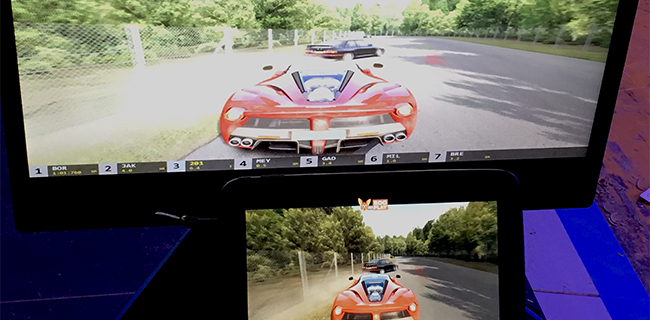Cloud games developer Rooplay is demonstrating how 5G could enable a new generation of mobile gaming by delivering a continuous, consistent high-speed connection with low-latency.
As a proof-of-concept, Rooplay compares the experience of playing a Formula 1 driving game over 4G and 5G networks. Visitors test-driving the game can have their fastest lap entered into a MWC 2017 5G championship.
The successful running of the cloud-based multi-player game will boost confidence in the ability of mobile operators to provide 5G networks powerful enough to support smooth hand-overs of user data from one cell to the next. It will utilize the networking principles developed from research into cell handovers by King’s College London (KCL).
The 5G Journey, in which the growth of the next generation of mobile technologies is nurtured, is one of the three key objectives of the GSMA’s Network 2020 program.
Two of the biggest problems for multiplayer gamers on the move are slow responses times and dropped connections, according to Rooplay CEO Jason Williams. This could change the way that games will be played on5G mobile services, said Williams.
Having a slow response time (network latency of less than 10 milliseconds)is a major handicap to a competitive gamer and dropped connections can be fatal. Either flaw gives rival players free license to take out their opponent. With the help of the new 5G-enabled cellular handover technique developed by KCL, this handicap can be overcome.
Boost to business In a wider context, the technology can boost productivity and prevent losses for any users of business applications on the move. As more business applications become cloud-enabled and more work is carried out on mobile devices, the continuity afforded by5G’s cellular handover could be increasingly valuable.
The handover technology works by predicting where a mobile user of apps is likely to go to next. By calculating the odds on which network cell they are likely to move into, the net-work’s BSS/OSS systems can prepare for the transfer of relevant data. Though some packets will inevitably be lost as the user moves across cells, disruption can be minimised as the loss of information is not a significant handicap in a game.
Representatives are on hand to provide greater details on KCL’s predictive pre-loading re-search. The GSMA is also releasing a report on The 5G Era: Age of Reliable Connectivity and Intelligent Automation. The report outlines five mobile industry goals for the 5G era which, by 2020, should delivery speeds of 1 Gbps with response times under 10 milliseconds.
See a demo preview of 4G vs 5G gaming here and visit Rooplay at Network 2020 in Cnnovation City, Hall 4.
To download the report click on the image below:

